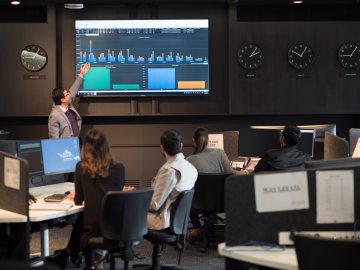Graduate Certificate in Financial Planning
Degree Level Postgraduate
Year 2025
You're considered an Australian student if you are any of the following:
Degree Level Postgraduate
Year 2025
Mode
On-campus/Online
Fees
$AU 15,100 per 0.5 EFTSL for students enrolled in 2025
Applicants are required to have one of the following:
A completed bachelor degree from a recognised higher education institution or equivalent; or
A completed graduate certificate or higher postgraduate qualification from a recognised higher education institution; or
A completed Diploma or Advanced Diploma in a relevant field and two years relevant professional experience; or A minimum of five (5) years relevant professional experience.
1UniSA Business is one of just 13 institutions in Australia and approximately 200 globally (from over 25,000 universities) to be EQUIS accredited. EFMD, March 2024. 2023 QS Stars Business School Ratings. 22024 THE Subject Rankings. 3Australian Financial Review BOSS Best Business Schools List 2024.

This qualification can serve as a bridging program for existing financial advisers who already hold an approved or relevant qualification and are only required to study a selection of remaining courses to meet FASEA education requirements.
We’ve embedded three FASEA-approved bridging courses into this program which you can study based on your prior learning and Treasury-approved professional designations.
These bridging courses include:
Depending on your individual circumstances, you may need to undertake one, or all, of these courses (each course is equivalent to a 4.5 unit postgraduate course).
Completing your courses this way will be formally recognised by Treasury.
You can also choose to study bridging courses as standalone courses on campus, 100% online, in mixed mode or as intensives, providing you with the flexibility to choose the best learning option for you.
This qualification can also be used as a direct entry pathway into our FASEA-approved Master of Finance (Financial Planning) if you do not hold a prior qualification but have industry experience in a related financial services role.
Following completion of the six-month graduate certificate, you will be eligible for Advanced Standing into our master’s program, shortening the duration of your program to 1.5 years. You will need to go on to study our master’s degree to meet Treasury education requirements.
What is a financial adviser?
Financial advisers assist clients to build and manage their personal wealth, tax, financial risk and spending over their lifetimes. They consider a number of factors, such as current wealth and income and lifestyle aspirations, to develop plans for their clients to reach short and long-term financial goals.
With a strong practical focus and access to state-of-the-art technology, you will learn how to prepare detailed financial plans and documentation which meet legal and regulatory requirements.
Definitions:

Our Graduate Certificate consists of four advanced financial planning courses which can be completed in six months full-time (or part-time equivalent). The courses you’re required to complete will depend on the level of education you currently hold.
Depending on your individual requirements, you’ll study either one FASEA-approved bridging course (Ethics and Professionalism), or all three of the bridging courses outlined below, plus an additional elective (if this is required). Electives include topics such as investment management, regulatory and legal obligations, estate planning, risk management and insurance, superannuation, and tax.
Please refer to the Australian Government's Financial Adviser Standards for further info.
*Students who intend to undertake the Graduate Diploma in Financial Planning or the Master of Finance (Financial Planning) should not choose Behavioural Finance Client and Consumer Behaviour as an elective in this program.

As one of the leading providers of accounting and finance education in Australia, you can be confident you will graduate with the knowledge and skills required to succeed in the financial services sector.
You’ll learn from expert academics and current practising financial advisers. Your studies are enriched in so many ways as you’ll gain unique insights from professionals who know the ins and outs of the industry and understand the unique challenges and opportunities that financial advisers face today.
Your course content has been developed in conjunction with leading industry experts to ensure that what you learn is practical, relevant and current to today’s changing business landscape.
UniSA Business is the only business school in South Australia accredited by both AACSB International (The Association to Advance Collegiate Schools of Business) and EFMD (EQUIS) – the world’s leading accreditation bodies recognising excellence in business education and research at a global level. These dual accreditations demonstrate the high standards we hold across all areas such as teaching, student learning and research, as well as our commitment to continually improving the quality of our programs.
Responding to industry needs
The financial services profession has recently introduced new education standards, making it more important than ever for practising and aspiring financial advisers to hold a recognised qualification.
If you’re currently working in financial planning, you’ll need to complete a Treasury-approved program by 2026 to continue practising. If you’re looking to enter the industry, you’ll now need to study a Treasury-approved program to start your career.
As part of your studies, you’ll have the opportunity to access exam preparation resources or workshops so you feel confident and prepared for your exams. We’ll provide you with useful strategies, tips and support – all the information you need to succeed.
Our flexible delivery and extracurricular opportunities are designed to suit your lifestyle, preferred learning style, and career interests. You can benefit from online and on-campus study, part-time or full-time learning, Summer and Winter School intensive courses, mentoring and networking opportunities with industry, and accelerated learning pathways. Plus, you can make the most of professional development courses endorsed by industry, build leadership skills by participating in the UniSA+ Award, or seek support at our on-campus Business Student Hub.
Hear from Geoff Pacecca, Founder and Principal Adviser of GAP Financial and UniSA Financial Planning lecturer, about our suite of programs and the benefits of furthering your unstoppable career at UniSA.

In addition to new education standards, Treasury has outlined new professional requirements. This includes completing a professional year (for new entrants only), passing a national exam, undertaking Continuing Professional Development (CPD) and completing a code of ethics course.
As the No.1 university in South Australia for Business and Economics1, our quality teaching and learning experiences will ensure you graduate ready to succeed.
The financial services industry is one of the leading sectors in the Australian economy and plays a key role in facilitating the productive flow of funds between industries, companies and people.
If you’re an existing financial adviser, your qualification opens up many more opportunities in your business and career.
If you’re looking to make a career change, there are a range of roles you could pursue in diverse businesses. There are opportunities in financial institutions, investment banks, superannuation and insurance funds, and financial advisory firms – or you could choose to be self-employed and set up your own practice. Financial advisers can also specialise in a number of areas, such as tax planning, risk management or retirement planning.
Careers to consider include:
12023 THE Subject Rankings.
Applying to study with us:
The Graduate Certificate in Financial Planning is not a Financial Adviser Standards and Ethics Authority (FASEA) approved program. Successful completion of the Graduate Certificate will provide students seeking to meet FASEA educational requirements for financial planning accreditation with entry to the FASEA approved DMFP Masters of Finance (Financial Planning)
Every year, over 2,500 UniSA students are supported in their studies through scholarships and grants worth millions of dollars. Check out the scholarships below. One of them may be perfect for you. Visit our scholarships page for more.
Available for students who are interested in undertaking specified activities with the aim of enhancing the overall student experience at UniSA.
Travel Grants are available to participate in our Study Overseas Programs. UniSA has agreement with over 80 institutions globally.
Our campuses have fantastic facilities including modern lecture theatres, libraries, workshops, laboratories, tech zones, and spaces that simulate real work environments. You’ll also find student gyms and campus sport activities to keep you active. We also offer flexible study options, with online resources available for accessing lecture recordings, virtual classrooms, library resources and learning support.
Adelaide also has a variety of accommodation options to suit different requirements and budgets. Options include dedicated student accommodation and private rentals. See our long-term accommodation pages, or explore our student accommodation by Scape on Bank Street in Adelaide’s lively cultural precinct, an ideal location for students. It is within easy reach of UniSA’s city and metropolitan campuses, Rundle Mall shopping, the Central Market, Chinatown, and the West End’s vibrant nightlife. It is also across the road from the Adelaide train station, and on bus and tram routes.
I am Program Director: Finance and Financial Planning in UniSA Business and Lecturer in Financial Planning and Finance. I have worked at the University of Greenwich (London) and have consulted both national and international organisations in economics, finance, and financial planning.
I teach in the areas of banking, finance, and financial planning, including personal financial planning, and personal risk management and insurance. My current research focuses on aspects of corporate social responsibility (CSR), environmental, sustainability and governance (ESG) factors, green finance, financial system governance and institutional reform, market spillovers, and the cost and provision of financial advice to lower socio-economic groups.
I am also a member of key industry professional bodies, and serve on relevant industry committees, enabling me to deliver the latest industry-informed knowledge to students. I believe my extensive experience helps me to understand and support students as they develop the necessary academic and practical skills to address real-world industry challenges, becoming experts in their area of interest.

The way you apply for UniSA will depend on the undergraduate or postgraduate coursework degree you're interested in studying.
The majority of applications are made via the South Australian Tertiary Admissions Centre (SATAC). Check out more information on the SATAC website and follow the appropriate process for your degree of interest.
There are a small number of degrees that you need to apply for through direct application processes. The process you need to follow will be listed on the 'How to Apply' section of the degree homepage, but you'll also be taken to where you need to go if you hit the 'apply' button.
If you are interested in studying one of our 100% online degrees you'll need to apply directly to UniSA Online.
You can find more information about the application processes for UniSA on our How to Apply webpage.
If you're more interested in applying for a postgraduate degree by research, check out and follow the information in our step by step guide to applying.
Applications for all degrees will close ahead of study commencing, but the timelines may vary for undergraduate and postgraduate degrees.
The deadline to apply to study a degree at UniSA for semester one (commencing late February) and be guaranteed equal consideration is generally in very late November or early December. While you may be able to apply after this date, you are not guaranteed to be considered equally with other applicants and your application may not be assessed in time for the main round of offers. More competitive degrees may not make any offers after the main offer round. Find more information on the Key Dates section of the SATAC website, but you can also call the Future Student Enquiries team for more information on 08 8302 376.
Many postgraduate by coursework degrees do not have set closing dates. The exceptions are highly competitive degrees, so it is best to check – either on the degree homepage on the SATAC website or by checking with our Future Student Enquiries team.
As most postgraduate applications are assessed as they are submitted and offers are continuous, there are no set closing dates for applications. Degrees can be filled and closed with little notice so it is best to apply as soon as possible to avoid missing out on a place. For more information, please contact our Future Student Enquires team on (08) 8302 2376 or submit an enquiry.
You may be eligible for credit or advanced standing for your chosen UniSA degree based on your previous studies, if they are in a related area and completed within a certain timeframe. Receiving credit or RPL will reduce the number of courses you undertake within the degree, and may also reduce the overall duration of your degree. You can read more about our pre-existing credit agreements through our online Credit Assessor. If you have related industry experience, you may also be eligible to receive recognised prior learning (RPL) for this experience. Credit and RPL is assessed by the Program Director once you've received an offer, and you apply through UniSA's current student experts, Campus Central.
Future Student Enquiries welcomes the opportunity to meet with you to discuss your study options at UniSA. We can discuss degree information, entry requirements and pathways, applications, general career outcomes and student life, so you have the information to make the best study decision for your future. Head to our Book an Appointment webpage to find a date and time to speak with us, and take your next steps on journey to university study.